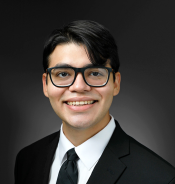ASU graduate student awarded NSF fellowship to study water insecurity along US–Mexico border communities

The Arizona Water for All (AW4A) team attended the 2023 One Water Summit to meet with state water leaders. From left: Marlene Rivas, program manager for Impact Water — Arizona; Dylan Diaz-Infante, researcher; and Daniela Sherrill, community participatory researcher. Photo courtesy Arizona Water for All
Water at the turn of a knob is something most of us take for granted. But there are still many places where people do not have access to clean running water. Dylan Diaz-Infante aims to change that.
Diaz-Infante is a sociocultural anthropology graduate student at the School of Human Evolution and Social Change at Arizona State University. He is passionate about water security and was recently awarded a prestigious NSF Graduate Research Fellowship Program (GRFP) grant to help fund his research on water-sharing within communities called "colonias" along the U.S.–Mexico border.
“My research focuses on these resilient communities that have developed across the U.S.–Mexico border outside of cities with roots in the Bracero Program of the 1950s, which brought Latin American workers from Mexico and other neighboring countries across the border to work in agriculture and other industries,” he said. “Workers were given rural lands to build homes on, literally from scratch. They came to be known as colonias.”
Diaz-Infante explained that, over the decades, cities, states and federal agencies have ignored the colonias in infrastructure planning, leaving many not only without running water — but also without electricity and paved roads. Although there has been some help from nongovernmental organizations, most of these communities have developed their own water utilities and obtained grant funding for underground water sources, he said.
“The research I proposed to the National Science Foundation — and what they gave me the Graduate Research Fellowship for — is to look into the ways colonias make sure everybody in the community has water,” Diaz-Infante said.
“This comes from an old concept in the social sciences from around the 1970s called the moral economy. It’s a kind of socially negotiated set of agreements that becomes a social infrastructure that’s dependent on people as opposed to a physical infrastructure, like pipes. In a moral economy, people use the language of morals and norms, like agua es vida, to secure water for those who need it from those who have it, and to find ways to maintain that access and work to keep or rework the arrangement in cases where people cannot fulfill their obligations at a given time.”
Diaz-Infante is also a researcher with the Arizona Water for All (AW4A) team, one of several pillars under the new statewide Arizona Water Innovation Initiative. As part of the AW4A team, he works under the leadership of President’s Professor Amber Wutich to collect data and do fieldwork with other scientists, legal scholars and community organizations who have ties to colonias communities.
“The ultimate goal of Arizona Water For All is to identify the most water-insecure communities across the state of Arizona and to conduct justice-oriented and impactful research where our collaborations can find the most effective interventions to help raise their overall level of water security, and to continually monitor these efforts to ensure that they work over the long term,” Diaz-Infante said.
More Local, national and global affairs

ASU selected to support DOD Irregular Warfare Center
Arizona State University has been selected to work closely with the U.S. Department of Defense to provide reputable academic research support to deepen the understanding of current and emerging…

Inspired by university tradition, a new lantern walk debuts with focus on mental health in the military
Arizona State University’s Lantern Walk is one of the school’s oldest and most treasured traditions. Each year, students, alumni and the Sun Devil community trek up “A” Mountain carrying lanterns to…
ASU-led study examines effects of political turmoil on young voters
Young adults approaching voting age in the U.S. are doing so in a political climate unlike any other.Over the past four years, growing party polarization and hot-button issues have been the topic of…
